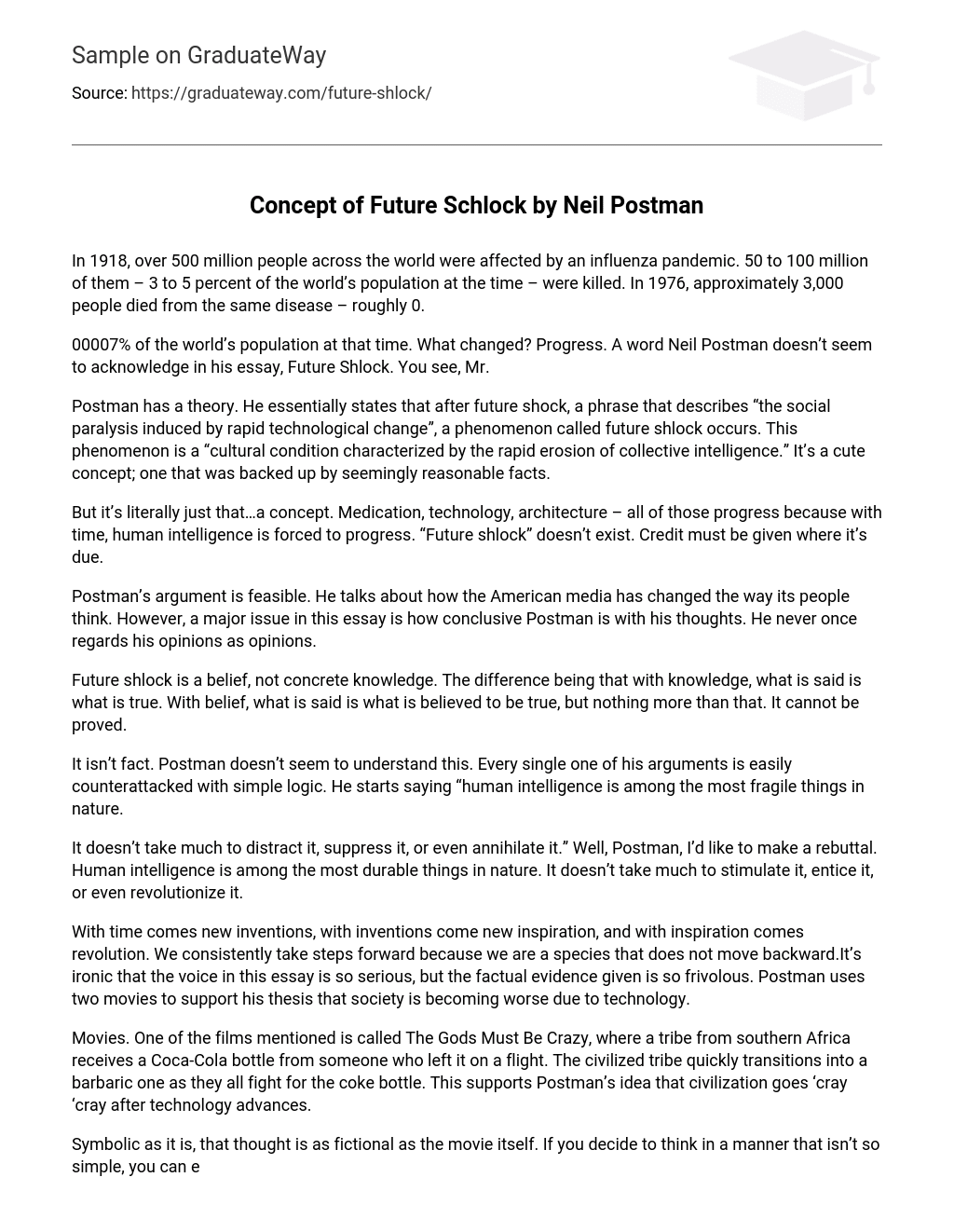In 1918, over 500 million people across the world were affected by an influenza pandemic. 50 to 100 million of them – 3 to 5 percent of the world’s population at the time – were killed. In 1976, approximately 3,000 people died from the same disease – roughly 0.
00007% of the world’s population at that time. What changed? Progress. A word Neil Postman doesn’t seem to acknowledge in his essay, Future Shlock. You see, Mr.
Postman has a theory. He essentially states that after future shock, a phrase that describes “the social paralysis induced by rapid technological change”, a phenomenon called future shlock occurs. This phenomenon is a “cultural condition characterized by the rapid erosion of collective intelligence.” It’s a cute concept; one that was backed up by seemingly reasonable facts.
But it’s literally just that…a concept. Medication, technology, architecture – all of those progress because with time, human intelligence is forced to progress. “Future shlock” doesn’t exist. Credit must be given where it’s due.
Postman’s argument is feasible. He talks about how the American media has changed the way its people think. However, a major issue in this essay is how conclusive Postman is with his thoughts. He never once regards his opinions as opinions.
Future shlock is a belief, not concrete knowledge. The difference being that with knowledge, what is said is what is true. With belief, what is said is what is believed to be true, but nothing more than that. It cannot be proved.
It isn’t fact. Postman doesn’t seem to understand this. Every single one of his arguments is easily counterattacked with simple logic. He starts saying “human intelligence is among the most fragile things in nature.
It doesn’t take much to distract it, suppress it, or even annihilate it.” Well, Postman, I’d like to make a rebuttal. Human intelligence is among the most durable things in nature. It doesn’t take much to stimulate it, entice it, or even revolutionize it.
With time comes new inventions, with inventions come new inspiration, and with inspiration comes revolution. We consistently take steps forward because we are a species that does not move backward.It’s ironic that the voice in this essay is so serious, but the factual evidence given is so frivolous. Postman uses two movies to support his thesis that society is becoming worse due to technology.
Movies. One of the films mentioned is called The Gods Must Be Crazy, where a tribe from southern Africa receives a Coca-Cola bottle from someone who left it on a flight. The civilized tribe quickly transitions into a barbaric one as they all fight for the coke bottle. This supports Postman’s idea that civilization goes ‘cray ‘cray after technology advances.
Symbolic as it is, that thought is as fictional as the movie itself. If you decide to think in a manner that isn’t so simple, you can easily argue that technology brings us together. As I write this, a friend of mine is chatting me on my phone about his day. A mother is asking where her child is.
A group of siblings are watching a video on YouTube and laughing at the goodness in life. Technology allows for new kinds of connectivity that simply wasn’t possible in a time that Postman viewed more sophisticated and intellectually advanced. There’s beauty in how the intellectuals that brought upon us extremely complex technology have made their products so simple to use. Simplicity, simplicity, simplicity.
Respect needs to be given to those intellectuals that Postman believes don’t exist anymore.Men work endlessly behind the scenes to make advancements possible. If everything Postman said was true – if culture truly was “distracted by trivia” – we would be living in the exact same world we did years ago. But the truth is that we don’t.
Every day we are faced with inventions amongst inventions that change the way we live. It is these inventions that prove that progress is an imminent fate we face every single day. Although it may seem that society as a whole isn’t spending all of its time in front of a textbook, that doesn’t necessarily equal stupidity. It indicates a change in culture.
Have you ever wondered why every year, getting into Harvard University proves to be more difficult? Because people are getting smarter. The bar has been increased, and people have to work ten times harder than they would have in the olden times. This is also why McDonald’s rejects more applicants than Harvard each year…working at minimal wage has even become more demanding. Pessimism is so prevalent in society where it is not needed.
If one could put aside their doubts in humanity and turn that into hope, we could be a different nation. But wherever there is a man who doubts another, there is a man who doubts themselves. People who cause revolution thrive off of disbelief from men like Neil Postman, whose lack of confidence in human intelligence does nothing but make you want to prove him wrong. We aren’t getting stupider, we’re just getting accustomed to the times.
What makes you intelligent today isn’t what made another intelligent a century ago. We progress. Now we have to compete with artificial intelligence in computers, and that makes life all the more interesting. We have to work harder than we did before.
If we can continue to keep up the pace, it won’t be that long until there are shots given at your local pharmacy to cure cancer. The future will continue to shock.





